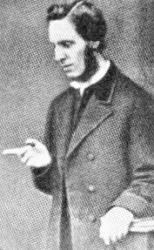1773 - 1862 Hymnal Number: 235 Author of "Our Blest Redeemer" in Best Endeavor Hymns Auber, Harriet, daughter of Mr. James Auber, b. in London, Oct. 4, 1773. During the greater part of her quiet and secluded life she resided at Broxbourne and Hoddesdon, Herts, and died at the latter place on the 20th Jan., 1862. Miss Auber wrote devotional and other poetry, but only a portion of the former was published in her Spirit of the Psalms, in 1829. This collection is mainly her work, and from it some useful versions of the Psalms have been taken and included in modern hymn-books, about 20 appearing in Spurgeon's Our Own Hymn Book, 1866. Miss Auber's name is widely known, but it is principally through her exquisite lyric, "Our blest Redeemer, ere He breathed," and the Epiphany hymn, "Bright was the guiding star that led." (For criticism of her work, see English Psalters, §. 17.)
In addition to these and other hymns by Miss Auber, which are annotated under their respective first lines, the following are also in C. V., but principally in America:—
1. Arise, ye people, and adore. Easter.
2. As Thy chosen people, Lord. Ps. lxciii.
3. Can guilty man indeed believe? Ps. xciv.
4. Delightful is the task to sing. Ps. cxlvii.
5. Father of Spirits, Nature's God. Ps. cxxxi.
6. Hail, gracious Source of every good. Ps. Ixv.
7. Hasten, Lord, the glorious time. Ps. lxxii.
8. Jehovah reigns, O earth, rejoice. Ps. xccii.
9. Join, all ye servants of the Lord. H. Scriptures.
10. Jesus, Lord, to Thee we sing. Ps. cx.
11. O all ye lands, rejoice in God. Ps. lxvi.
12. O God our Strength, to Thee the song. Ps. lIxxxi.
13. O praise our great and gracious Lord. Ps. lxxviii.
14. On thy church, O power divine. Ps. lxvii.
15. Sweet is the work, O Lord. Sunday.
16. That Thou, O Lord, art ever nigh. Ps. lxxv.
17. The Lord, Who hath redeemed our souls. Ps. xxxi.
18. When all bespeaks a Father's love. Ps. set.
19. When dangers press and fears invade. Ps. lxii.
20. Who, O Lord, when life is o'er. Ps. xv.
21. Whom have we Lord, in heaven, but Thee. Ps. lxxiii.
22. Wide, ye heavenly gates, unfold. Ascension.
23. With hearts in love abounding. Ps. xlv.
24. With joy we hail the sacred day. Sunday.
25. Vainly through the night the ranger. Ps. cxvii.
All these psalm-versions and hymns are from her Spirit of the Psalms, London, 1829.
- John Julian, Dictionary of Hymnology (1907)
=========================
Auber, Harriet, p. 90, ii. The following versions of psalms from her Spirit of the Psalms, 1829, are also in common use:-
1. Great God, wert Thou extreme to mark. Ps. cxxx. "Thy servants in the temple watched," begins with stanza ii. of this.
2. How blest are they who daily prove. Ps. xli.
3. How blest the children of the Lord. Altered from Ps. cxii.
4. Jehovah, great and awful name. Part of Ps. Ixxviii.
5. 0 Thou Whom heaven's bright host revere. Ps. Ixxxiv.
6. Praise the Lord, our mighty King. Ps. cxxxv.
7. Spirit of peace, Who as a [celestial] Dove. Ps. cxxxiii.
8. Thou by Whose strength the mountains stand. Ps. Ixv.
9. To heaven our longing eyes we raise. Ps. cxxi.
10. Vainly through night's weary hours. Ps. cxxvii. Sometimes "Vainly through the night the ranger."
11. While all the golden harps above. Easter.
--John Julian, Dictionary of Hymnology, Appendix, Part II (1907)
See also in:Hymn Writers of the Church
Harriet Auber


 My Starred Hymns
My Starred Hymns









